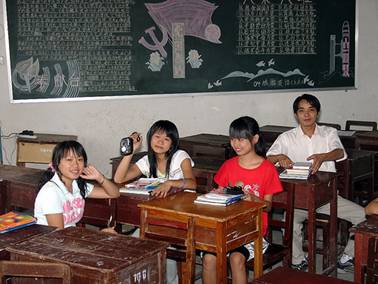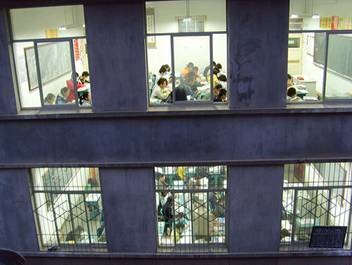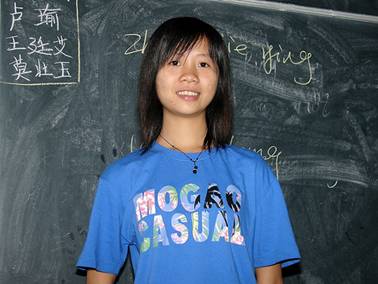Summer is upon us. I can tell because of the rising temperatures and the sudden anxiety of my students over exams, homework, and parent meetings. All of a sudden students who were mediocre all year long are pulling out all the stops, trying to bring that grade up, trying to pass the TOEFL, or cramming for their first shot at the SATs in May.
I work at an international high school, which means my students don’t have the usual concerns of Chinese students, but rather they all have their eyes on the ultimate prize – a place in a top American university, maybe even a scholarship. My students, although predominantly Chinese, take AP classes. They study Literature, learning how to distinguish similes from metaphors, and oftentimes our discussions include crash courses in Western history. “What’s a Protestant,” a student asked me recently, which branched into a quick lesson on the Pope, Luther, and Henry VIII and his 6 many wives. My students ponder over questions on the SAT that ask them to identify a sardonic tone, commit words to memory like “apparition,” “appellation” and “apartheid,” while their counterparts in normal schools are struggling with the difference between “angel” and “angle.”

Photo: drs2biz
The main difference between my students and other Chinese high school students, however, is the notable lack of gaokao in my students’ lives. For most Chinese high school students gaokao, or the university entrance examinations, signifies not only a rite of passage, but the one major determining factor in a young person’s life. Gaokao decides whether or not you will be a college student or a taxi driver. It decides, if you are admitted to college, whether or not you’ll be at the hallowed halls of Beijing University, or relegated to the likes of Baotou Agricultural Institute. The significance of the gaokao cannot be underestimated, and students prepare their entire lives, but particularly, their entire high school careers, for those few days that can make or break you.
The idea that a single test can be so all important is foreign to most expats in China. Hearing about students committing suicide over lower than expected gaokao scores, I always felt it was such a waste. After all, back home you can go to college at 18 or you can go at 38. If your grades in high school weren’t up to par, there’s always community college. America is full of stories about people defying tremendous odds and gaining an education, about people rising above the circumstances they were born to and making different choices. China, however, has fewer of these stories. While it is possible, if you muck up the gaokao, to resit the exam and try again, the process is not simple, and the further you get from high school the harder it becomes to do well on a test that basically covers everything you should have learned by year 12. Moreover, what makes the gaokao so daunting is that it is black and white. You pass, or you don’t. There’s no essay to factor in, there are no recommendation letters that might persuade the dean of admissions, and even a high GPA can’t save you from the fate that a low score on the gaokao seals you to. It is quantitative in the extreme.

Photo: Aaron.huo
Ironically, as my Chinese students look for alternatives to the gaokao, choosing to apply to American schools, taking the SAT, building up a portfolio of writing and participating in volunteer work, there are those back home who think the Chinese system, the emphasis on testing and testing alone, is something to emulate. My mother, an elementary school teacher, recently wrote me despairing about how her class performed more poorly than expected on their standardized tests. Standardized tests are no laughing matter in the States these days. When I was in school they were simply used for statistical purposes, and as a way for teachers to objectively evaluate each student’s progress. Now standardized tests have become a “must pass or else” in much the same way that the gaokao, and other tests leading up to it, are in China.

Photo: drs2biz
So I wish the thousands of Chinese students currently preparing for the college entrance exams the best of luck, but I also hope, at the same time, that the many who do not achieve their desired scores will remember that hopefully there is more value to their education than simply the sum total of their Math, Politics, Physics, English, and Chinese grades. I hope they will remember their high school years with fondness, remember a teacher who made them consider a calculus problem in a new light, or an English word that delighted them with its sound, or a story from history that captured their imaginations. These are the true gifts that education gives us, worth much more than the scores on any test.
***
Related Links
Gaokao – The Biggest (most important?) Test in the World
Do Chinese students study too much?
Salary top of concerns in new teacher survey
Warning:The use of any news and articles published on eChinacities.com without written permission from eChinacities.com constitutes copyright infringement, and legal action can be taken.
All comments are subject to moderation by eChinacities.com staff. Because we wish to encourage healthy and productive dialogue we ask that all comments remain polite, free of profanity or name calling, and relevant to the original post and subsequent discussion. Comments will not be deleted because of the viewpoints they express, only if the mode of expression itself is inappropriate.
Please login to add a comment. Click here to login immediately.